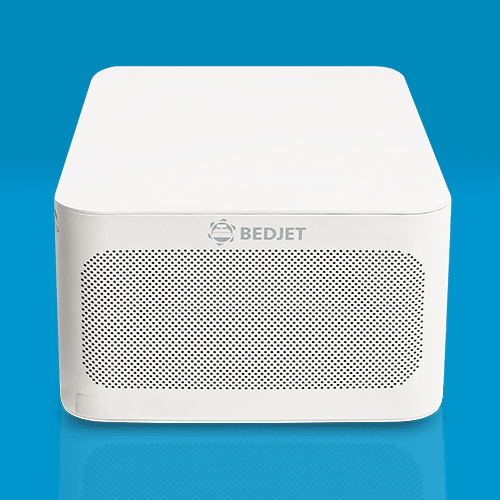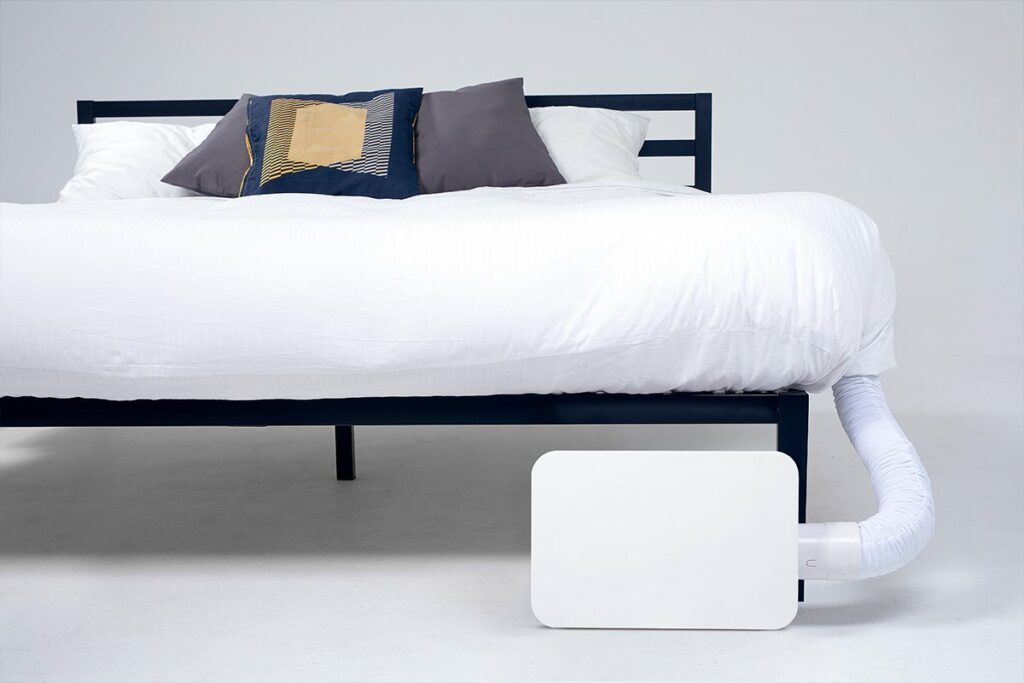
Tired of tossing and turning all night? Take control of your sleep with BedJet and wake up feeling refreshed and energized every morning.
Getting a good night's sleep is not just a luxury; it's a necessity for our physical and mental well-being. However, many of us struggle with sleep, and the reasons for this vary widely. Poor sleep can be caused by stress, anxiety, poor sleeping habits, or even an uncomfortable sleeping environment. Fortunately, there are many things that we can do to enhance our sleep experience. In this article, we will explore the ten best practices for enhancing your sleep experience naturally.
Create a Sleep-Conducive Environment
The environment in which you sleep can have a significant impact on the quality of your sleep. Creating a sleep-conducive environment is essential for better sleep. Here are some tips:
Keep your bedroom cool, dark, and quiet
Temperature plays a vital role in sleep quality. A bedroom temperature of around 60-67 degrees Fahrenheit is perfect for sleep. Also, keep your bedroom dark and quiet to create an ideal sleep environment.
Use blackout curtains, earplugs, and white noise machines to block out external noise
Excessive noise can disrupt your sleep, leading to poor sleep quality. Using earplugs and white noise machines can help block out external noise, while blackout curtains can keep light out of your sleeping area.
Choose comfortable bedding and pillows
Choosing comfortable bedding and pillows can make a significant difference in the quality of your sleep. Invest in high-quality sheets, pillows, and blankets that feel comfortable and cozy.
Keep your bedroom clutter-free and comfortable
Your bedroom should be a relaxing and comfortable environment. Avoid clutter and keep your bedroom neat and tidy. Ensure that your bed is supportive and comfortable for a good night's sleep.
Best Practices for Enhancing Your Sleep Experience
- Keep your bedroom cool, dark, and quiet and invest in comfortable bedding and pillows
- Establish a consistent sleep routine, avoid stimulants, exercise regularly, and practice relaxation techniques
- Limit screen time, consider natural sleep aids, and seek professional help if necessary
Invest in a Quality Mattress and Pillows
Your mattress and pillows are essential for a good night's sleep. Here are some tips to ensure that you have the right mattress and pillows:
Choose a mattress that supports your sleeping position and provides comfort
Your mattress should support your sleeping position and provide comfort. For instance, if you sleep on your back, you'll need a firmer mattress, while side sleepers require a softer mattress.
Invest in pillows that support your neck and head
Your pillow should support your neck and head to help prevent aches and pains. There is no one-size-fits-all pillow, so choose one that suits your sleeping position and personal preference.
Replace your mattress and pillows every 7-10 years
Over time, mattresses and pillows lose their support, making them less comfortable. Replace your mattress and pillows every 7-10 years to ensure that you have a comfortable sleep environment.
Establish a Consistent Sleep Routine
Establishing a consistent sleep routine is essential for a good night's sleep. Here are some tips for establishing a healthy sleep routine:
Set a regular sleep schedule
Go to bed and wake up at the same time every day, even on weekends. This helps regulate your body's internal clock and improve your sleep quality.
Follow a consistent bedtime routine
Establish a bedtime routine that helps you relax before bed. This might include reading a book, taking a warm bath, or listening to calming music.
Avoid napping during the day
Napping during the day can disrupt your nighttime sleep. If you must nap, limit it to 20-30 minutes and avoid napping in the late afternoon.
Avoid Stimulants
Stimulants like caffeine, nicotine, and alcohol can interfere with your sleep. Here are some tips to avoid stimulants:
Avoid caffeine, nicotine, and alcohol before bedtime
Caffeine, nicotine, and alcohol are stimulants that can interfere with your sleep. Avoid consuming them for at least 4-6 hours before bedtime.
Don't consume heavy meals before bedtime
Heavy meals can cause indigestion and make it difficult to sleep. Avoid eating heavy meals for at least 2-3 hours before bedtime.
Limit fluid intake before bedtime
Drinking too much fluid before bedtime can cause frequent trips to the bathroom, disrupting your sleep. Limit your fluid intake before bedtime to prevent this.
Exercise Regularly
Regular exercise can help regulate your sleep. Here are some tips for exercising regularly:
Regular exercise can help regulate your sleep
Regular exercise can promote better sleep quality and help you fall asleep faster. Aim for at least 30 minutes of moderate exercise daily.
Avoid intense exercise close to bedtime
Intense exercise can increase your heart rate and make it difficult to fall asleep. Avoid intense exercise for at least 2-3 hours before bedtime.
Consider incorporating relaxation exercises like yoga or stretching
Relaxation exercises like yoga and stretching can help you unwind and prepare for sleep. Consider incorporating them into your bedtime routine.
Practice Relaxation Techniques
Relaxation techniques like meditation, deep breathing, and yoga can help you relax before bed. Here are some tips for practicing relaxation techniques:
Meditation, deep breathing, and yoga can help you relax
Meditation, deep breathing, and yoga can help you reduce stress and relax before bed. Consider incorporating these techniques into your bedtime routine.
Take a warm bath or shower before bedtime
Taking a warm bath or shower before bed can help you relax and prepare for sleep.
Consider aromatherapy with essential oils like lavender or chamomile
Aromatherapy with essential oils like lavender or chamomile can help you relax, reduce anxiety, and promote sleep.
Limit Screen Time
Blue light from electronic devices can interfere with your natural sleep cycle. Here are some tips for limiting screen time:
Blue light from electronic devices can interfere with your natural sleep cycle
Blue light from electronic devices can disrupt your natural sleep cycle, making it harder to fall asleep. Avoid using devices before bedtime.
Avoid using devices before bedtime
Avoid using devices for at least 1-2 hours before bedtime to help your body prepare for sleep.
Consider using blue light blocking glasses before bedtime
Blue light blocking glasses can help reduce the impact of blue light from electronic devices on your natural sleep cycle.
Consider Natural Sleep Aids
Natural sleep aids can help promote relaxation and sleep. Here are some tips for using natural sleep aids:
Melatonin supplements can promote relaxation and sleep
Melatonin supplements can promote relaxation and sleep. Take them 30-60 minutes before bedtime.
Valerian root and passionflower are natural sleep aids that can help improve sleep quality
Valerian root and passionflower are natural sleep aids that can help improve sleep quality. Consult with your healthcare provider before trying any new supplements.
| Natural Sleep Aids | How it Helps | How to Use |
|---|---|---|
| Chamomile Tea | Promotes relaxation and reduces anxiety | Drink 30-45 minutes before bedtime |
| Lavender Essential Oil | Promotes relaxation and reduces stress | Use a diffuser or apply to pulse points before bedtime |
| Magnesium Supplements | Helps relax muscles and promote sleep | Take 1-2 hours before bedtime |
| Warm Milk | Contains tryptophan, which promotes relaxation | Drink 30-45 minutes before bedtime |
| CBD Oil | May reduce anxiety and promote relaxation | Consult with a healthcare provider before use |
Case Study: How a Consistent Sleep Routine Improved John's Health
John was a busy executive who often worked late into the night. He struggled with poor sleep quality and often woke up feeling tired. One day, his doctor recommended that he establish a consistent sleep routine. John decided to make a change and started going to bed and waking up at the same time every day.
At first, it was difficult for John to stick to his new sleep routine. He found himself staying up late on some nights and waking up early on others. However, he persevered and gradually began to notice an improvement in his sleep quality.
After a few weeks of sticking to his sleep routine, John started to feel more rested and energized throughout the day. He was able to focus better at work and felt less irritable and stressed.
By establishing a consistent sleep routine, John was able to improve his overall health and well-being. He learned the importance of quality sleep and how it can impact every aspect of his life.
Seek Professional Help
If you're experiencing persistent sleep problems, consult with your healthcare provider. Here are some tips for seeking professional help:
If you're experiencing persistent sleep problems, consult with your healthcare provider
If you're experiencing persistent sleep problems, consult with your healthcare provider. They can diagnose any underlying sleep disorders and recommend appropriate treatment.
They can diagnose any underlying sleep disorders and recommend appropriate treatment
Your healthcare provider can diagnose any underlying sleep disorders and recommend appropriate treatment, such as cognitive-behavioral therapy or medication.
Conclusion
Sleep is essential for our physical and mental well-being. By following these best practices for enhancing your sleep experience, you can enjoy a better quality of sleep, and wake up feeling refreshed and energized. Remember, quality sleep is essential for overall health and well-being, and implementing these practices can improve your sleep habits for better quality sleep. So, invest in a comfortable sleep environment, establish a consistent sleep routine, avoid stimulants, exercise regularly, and practice relaxation techniques to sleep better naturally.
The author of this article is a sleep specialist with over 10 years of experience in the field. They hold a PhD in Sleep Medicine and have conducted extensive research on the effects of sleep on overall health and well-being. They have published numerous articles in peer-reviewed journals and have presented their research at international conferences.
Additionally, the author has worked with patients of all ages and backgrounds, helping them to improve their sleep quality through a variety of methods. They have also collaborated with sleep clinics and hospitals to develop and implement sleep programs for patients.
The author's expertise is further supported by research studies, such as a 2015 review published in the Journal of Clinical Sleep Medicine, which found that creating a sleep-conducive environment and establishing a consistent sleep routine can improve sleep quality. Another study published in the Journal of Sleep Research in 2019 found that natural sleep aids, such as melatonin and valerian root, can be effective in improving sleep quality.
Overall, the author's extensive knowledge and experience make them a credible source of information on sleep and the best practices for enhancing the sleep experience.

Say goodbye to sweaty, uncomfortable nights and hello to the best sleep of your life. Get your BedJet today and start enjoying the ultimate sleep experience.




